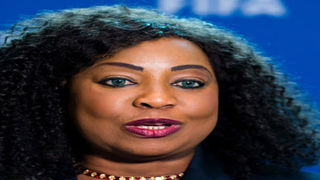
Fifa secretary general Fatma Samoura.
| File | AFPTalkUP!
Premium
What were FKF and Fifa chief Samoura hiding when they refused to talk to Kenyans?
What you need to know:
- The federation leadership noisily parrots how it has moved Kenyan football forward. It is thus a great paradox to see FKF elaborately avoid standing on stage with their parent body to reiterate the “success stories” they like to tell to the birds.
The power of sports to transform lives and influence attitudes is indubitable.
Sports personalities, their minders, marketers, politicians and just about everybody who understands this will welcome every opportunity to articulate their cause.
The popularity of the sport or sport personality means the media microphones and recorders will be ever present.
Pepsi Cola understood this when they brought Edson Arantes do Nacimento aka Pele -- to my mind, the greatest footballer of our time -- to Kenya in 1976 to conduct coaching clinics, meet people and engage in an exhibition match.
The man, then retired, was treated like royalty, and Kenyans, already in love with him for his prodigious football exploits, fell all over themselves to get a piece of him.
Pele returned briefly in 1979 promising to invest in the country.
“I have picked Kenya because it is a beautiful country with friendly people, a good climate, good business prospects, good international communication facilities and a stable Government,” Pele said in an interview with the Nation on February 26 that year.
He profusely praised President Moi's leadership. What more did he need to do to adhere himself to the Kenyan people?
Mohammed Ali, considered the greatest sportsman of all time, also came to Kenya in 1980. The then boxing legend was touring the country on behalf of the US government to rally African nations to boycott the 1980 Moscow Olympic Games in protest at Soviet Union’s invasion of Afghanistan.
He met President Moi at State House, played in an exhibition fight, visited a school, gave interviews. The heavyweight boxing legend must have done his work well. Kenya did not participate in those Games.
Where am I going with this trip back in time? Let me give a few more examples first. Two International Olympic Committee presidents have visited Kenya before.
The first was long-serving boss Juan Antonio Samaranch, who toured Kenya in 2001. His itinerary was jam-packed with functions in Nairobi, Eldoret and Mombasa where he attended a general assembly of the Association of National Olympic Committees of Africa.
I remember there was no slot in his programme for a media conference, but at the instigation of hungry for news scribes led by Omole Asike of KBC, NOC-K president then Kipchoge Keino organised for one with the obliging Spaniard.
Samaranch’s successor Jacques Rogge came to Kenya in 2005 for five days. I particularly remember this visit because I had the privilege of covering it as a junior reporter then for Nation.
Rogge’s itinerary included visiting President Mwai Kibaki and meeting with Sports Minister, Ochilo Ayacko.
Importantly, he held an extensive press conference in Nairobi to talk about the Olympism and its work. I remember asking him how his name “Rogge” was pronounced. Many journalists had gotten it wrong, and you could tell by their hushed attentiveness as the Belgian replied with amusement.
World Athletes president Sebastien Coe has visited the country on more than one occasion, meeting President Uhuru Kenyatta, Sports CS Amina Mohamed, top government officials and local athletics personalities.
He is ever ready to attend press conferences, give press interviews to articulate the work of the world body, speak for athletes around the world and give a good word about Kenya.
Which now brings me to my point. How can Fifa Secretary General Fatma Samoura, the first African, and woman to hold this lofty position, visit Kenya for three days and not address a press conference or even grant an interview to any news outlet?
The sec-gen is a very senior and powerful position in Fifa. One would have thought that with this rare visit to this part of the world the Fifa boss would have been keen to directly engage the inhabitants here and talk about the work and funding the world body is doing to develop the most popular game in the world here.
Considering where Fifa has come from in the recent past with the corruption scandals that claimed its previous leadership, would it not have been apt for Fifa and by extension its local affiliate here, Football Kenya Federation, to exhibit greater transparency and accountability?
Tellingly, Samoura did not officially meet any senior government official. I would have been keen to ask her the following:
One, Fifa gave FKF $1.35 million to purchase Outside Broadcasting equipment. To date, the project is just thin air, yet FKF ostensibly spent the money to buy an OB van from a UK-based company, WTS Media Group, that reportedly went under. Is Fifa aware of this? Is Fifa satisfied with FKF’s accounting of the said expenditure? How so?
Two, Fifa granted FKF $1 million Covide-19 relief. To date, the money has never been accounted for publicly, with stakeholders – clubs and players saying they have never received any financial or material assistance from the federation to mitigate the effects of the virus.
The federation did pay for Covid-19 tests but for selected clubs. Is Fifa content with this dubious expenditure? What was the purpose of this relief money anyway?
Three, how much money has Fifa given FKF for women football development over the past five years and how has this money been spent?
Fourth, is not introducing a biennial Fifa World Cup going to destroy the Africa Cup of Nations?
The federation leadership noisily parrots how it has moved Kenyan football forward. It is thus a great paradox to see FKF elaborately avoid standing on stage with their parent body to reiterate the “success stories” they like to tell to the birds.




